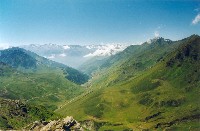 The Tour de France has a long tradition of visiting the Pyrenees, beginning with the Col du Tourmalet back in 1910. The one hundredth anniversary of the including of that climb will be commemorated with two ascents of the mountain, a road race stage and a time trial, but it appears there is a strong chance that other well-know ascents in the area could disappear from the Tour.
The Tour de France has a long tradition of visiting the Pyrenees, beginning with the Col du Tourmalet back in 1910. The one hundredth anniversary of the including of that climb will be commemorated with two ascents of the mountain, a road race stage and a time trial, but it appears there is a strong chance that other well-know ascents in the area could disappear from the Tour.
According to the website Ladepeche.fr, officials in the nearby department [region] of Ariège are no longer certain that it can afford to host stages of the race. If this proves to be the case, it would mean that climbs such as the finishing peak on July 18th, Ax 3 Domaines, could be appearing for the final time. The following day’s start from Pamiers would also potentially be the last, as it too is in the area.
Since 1984, Ariège has been the location for eleven starts and 13 finishes but, as Augustine Bonrepaux said in recent days, this could change.
“Ax and Pamiers are lucky,” stated the president of the general council. “This may be the last time that Ariège hosts the Tour de France…
“Going forward, the Tour de France will bypass the Ariège if those who benefit are not financially involved.”
Counsellor Henry Nayrou gave a longer explanation of the reasons behind the crisis. “For about ten years, we wanted a strong communication policy so that the Ariège and Ardèche regions would not be confused with each other,” he said. “That is why the council decided to pay the entrance fee into the Tour [the host costs], leaving the costs of the organisation to the communities. This year, the council must make savings, particularly in its grants. For 2010 we will keep our commitments, but for 2011 we must cut back by 50%. We are simply asking to increase others’ contributions, with businesses, chambers of commerce….”
According to the French newspaper’s website, hosting a start and a finish will cost over €200,000 in fees this year. It’s clear that the local council feels that it can no longer afford to put up so much cash, and so the response of local businesses is crucial.
As the Tour de France has grown and the commercial interests have become more important, a case can be made that this has affected the racing. The route is developed in line with the areas that are prepared to pay for it to visit; it can be debated that this is one reason for the smaller number of summit finishes when compared to the Giro d’Italia and the Vuelta a España. High costs of hosting the race essentially limit the number of communities which can pay.
The 2009 route of the race received a lot of criticism because some key climbs were followed by long descents to the finish, thus limiting their impact on the standings. Time will tell how things pan out but most in the sport would hope that this does not result in key battlegrounds being left out, or for the financial constraints in Ariège to be followed by similar cutbacks in other regions of the Pyrenees.